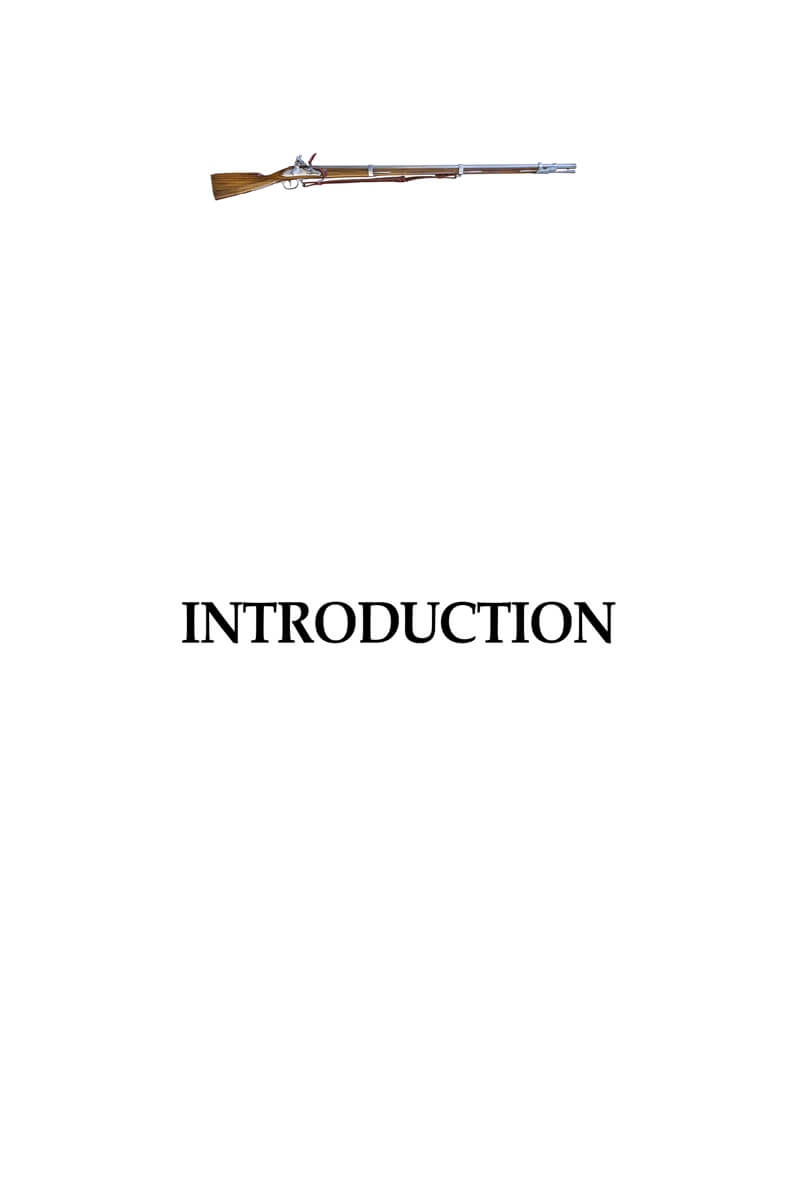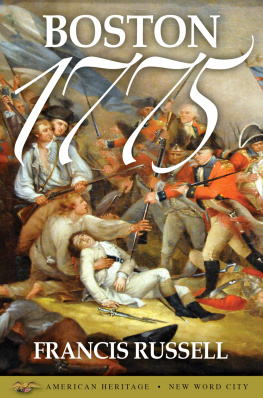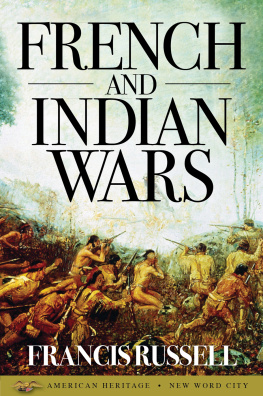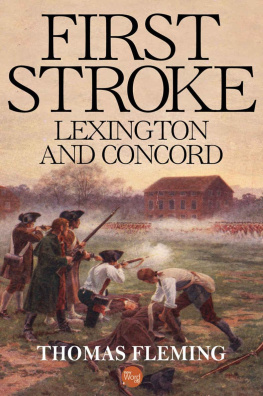Francis Russell - Boston 1775
Here you can read online Francis Russell - Boston 1775 full text of the book (entire story) in english for free. Download pdf and epub, get meaning, cover and reviews about this ebook. year: 2014, publisher: New Word City, Inc., genre: Detective and thriller. Description of the work, (preface) as well as reviews are available. Best literature library LitArk.com created for fans of good reading and offers a wide selection of genres:
Romance novel
Science fiction
Adventure
Detective
Science
History
Home and family
Prose
Art
Politics
Computer
Non-fiction
Religion
Business
Children
Humor
Choose a favorite category and find really read worthwhile books. Enjoy immersion in the world of imagination, feel the emotions of the characters or learn something new for yourself, make an fascinating discovery.
- Book:Boston 1775
- Author:
- Publisher:New Word City, Inc.
- Genre:
- Year:2014
- Rating:3 / 5
- Favourites:Add to favourites
- Your mark:
- 60
- 1
- 2
- 3
- 4
- 5
Boston 1775: summary, description and annotation
We offer to read an annotation, description, summary or preface (depends on what the author of the book "Boston 1775" wrote himself). If you haven't found the necessary information about the book — write in the comments, we will try to find it.
The leading actors and events in Boston in the 1770sSamuel Adams, John Hancock, the Boston Tea Party, Lexington, Concord, and Bunker Hillhave assumed a cherished place in history. Yet, with the passage of time, a layer of legend has obscured the true picture. Here, from award-winning author Francis Russell, is the bloody story of the early days of the American Revolution.
Boston 1775 — read online for free the complete book (whole text) full work
Below is the text of the book, divided by pages. System saving the place of the last page read, allows you to conveniently read the book "Boston 1775" online for free, without having to search again every time where you left off. Put a bookmark, and you can go to the page where you finished reading at any time.
Font size:
Interval:
Bookmark:

The opening scenes of the American Revolution were acted out some 240 years ago. The leading actors and events Samuel Adams and John Hancock ; the Boston Tea Party , Lexington and Concord , and Bunker Hill - have assumed a cherished place in our history. Yet, with the passage of time, a layer of legend and romance has settled over these scenes, sometimes obscuring the true picture.
The legend persists that the Revolution was brought about by moderate men rebelling against harsh British tyranny. But, in reality, the cause of liberty was spearheaded by radical leaders whose strident cries drowned out the voices of the moderates. Both the Boston Massacre and the Boston Tea Party were the result of mob violence sparked by such men as Adams and Hancock. We sometimes forget that in the decade before the Revolution, Boston and other American cities were, at times, ruled by brutal street mobs that sacked the homes of officials and assaulted anyone who opposed them.
A haze of romance also shrouds the first battles of the war. The minutemen who fought the redcoats on April 19, 1775, were not the deadly marksmen later generations have supposed - only one of every 300 bullets they fired hit anything. And for every colonial who faced with cool courage the British bayonets at Bunker Hill, two others fled or refused to aid their hard-pressed comrades. This first major engagement of the war is even misnamed. It was not fought on Bunker Hill at all, but on nearby Breeds Hill.
The Americans who made the Revolution were average men and women challenging the greatest military power of their time, and if they sometimes made mistakes or ran from the sound of the guns, it is not surprising. It should be a source of pride for us to realize that enough of these people stood up to the redcoats at Lexington and Concord and Breeds Hill to triumph.
The Revolution lasted six long, bloody years before the thirteen colonies won their independence, yet the pattern was set in those first few months. Against long odds, despite military defeat, the Americans hung on and won their objective. Fortunately, they were willing to accept Patrick Henry s grim terms: I know not what course others may take; but for me, give me liberty or give me death!

I then went Home, took my Boots and Surtout, and went to the North part of the Town, Where I had kept a Boat; two friends rowed me across Charles River, a little to the eastward where the Somerset Man of War lay. It was then young flood, the Ship was winding, and the moon was Rising. They landed me on Charlestown side... and I went to git me a Horse.
So wrote Paul Revere of his ride of April 18, 1775, the most famous in American history. He and his two friends were fortunate to slip across the river so easily, for the Somerset, with sentinels alert, was anchored in the channel to prevent such a crossing - and the moon was full that night. But they managed to muffle their oars with a petticoat they had borrowed from a friendly young lady and reached the opposite shore unobserved.
Boston, behind them, was a virtual garrison town, with 4,000 British troops quartered among the 20,000 inhabitants. Since June 1774 - six months after Bostonians masquerading as Indians had dumped the East India Company s tea into the harbor - the port of Boston had been closed by act of Parliament. Closed it would remain, His Majestys government announced, until the tea was paid for.
The force to padlock the Boston peninsula was furnished by nine regiments of regulars, plus parts of two others. Many of these troops had disembarked in the spring of 1774. From Ireland had come the Kings Own, the 5th, the 38th, the 43rd, and three companies of the Royal Irish. The Royal Welch Fusiliers and their goat mascot arrived from New York. Besides the numbered regiments, there were enough marines to make up a regiment of their own and an artillery train that camped on Boston Common.
While Bostons commercial life withered, affairs were humming in the outlying, unoccupied towns. Growing numbers of Whigs - those who in varying degrees and for varying reasons were opposed to the royal authority - had been gathering powder and supplies for a foreseeable clash with the redcoats. On village greens across New England, the minutemen had begun to drill, preparing for action at a moments notice.
Military security was not part of the eighteenth-century consciousness, and talk and information flowed freely in and out of Boston. Lieutenant General the Honorable Thomas Gage , governor of the Province of Massachusetts Bay and commander of all His Majestys forces in the American colonies, knew where nearly all of the colonists ammunition dumps were hidden. The colonists, in turn, were aware of every British troop movement almost as soon as General Gage had issued his orders.
By April 15, 1775, it was clear that the redcoats were up to something. Boats belonging to the troop transports were being tested, and grenadiers and light infantry were taken off duty and assembled on the common.
Two of the most outspoken Whigs, Samuel Adams and John Hancock, had wisely left Boston and were staying in Lexington. They planned to leave soon for Philadelphia as delegates to the Second Continental Congress . The First Continental Congress - that assembly of twelve of the thirteen colonies that met the year before - had respectfully set forth American grievances to King George III but had made no claim to independence. Sam Adams undoubtedly hoped for a more violent outcome from the Second.
Paul Revere, skilled silversmith and well-known Boston citizen, had often served as a trusted messenger for the Whigs, carrying their secret dispatches to New York and Philadelphia. On Sunday, April 16, he was sent to Lexington by the amiable and tireless Dr. Joseph Warren to warn Adams and Hancock that Gages troops were planning a sortie - a sortie probably aimed at seizing them as well as the large ammunition dump at nearby Concord.
Revere rode to Lexington and back without haste and without incident. Returning by way of Charlestown, he stopped to see the local militia colonel, William Conant, to tell him that he would try to reach Charlestown when the British moved. In case he could not cross the river, he would arrange to show a signal light from the steeple of North Church - two lanterns if they left by boats, one if they started overland.
Two days later, on Tuesday, April 18, General Gage had completed his arrangements. Each British regiment was made up of eight companies of foot soldiers, a company of light infantry, and one of grenadiers. The light infantry were chosen for their dash and boldness as skirmishers, the grenadiers for their height and strength. Some 700 of these troops, under the command of Lieutenant Colonel Francis Smith , were to embark from the foot of the common, cross to Cambridge, and then march through Menotomy (Arlington) and Lexington seventeen miles to Concord.
There, they would seize and destroy all Artillery, Ammunition, Provisions, Tents, Small Arms, and all Military Stores whatever. General Gage doubted that the damned rebels would take up arms against his Majestys Troops. Smiths second-in-command was Major John Pitcairn of the Royal Marines, a soldier who had been billeted almost next door to the Reveres and who was well-liked even by those Bostonians who disliked the British most.
By Tuesday afternoon, Colonel Smiths men were in battle order, and it was clear that they were ready to march. But where? The answer was soon furnished to Revere and his friends by a groom who had overheard some of the younger officers joking in the stables. Concord was their goal.
Font size:
Interval:
Bookmark:
Similar books «Boston 1775»
Look at similar books to Boston 1775. We have selected literature similar in name and meaning in the hope of providing readers with more options to find new, interesting, not yet read works.
Discussion, reviews of the book Boston 1775 and just readers' own opinions. Leave your comments, write what you think about the work, its meaning or the main characters. Specify what exactly you liked and what you didn't like, and why you think so.







